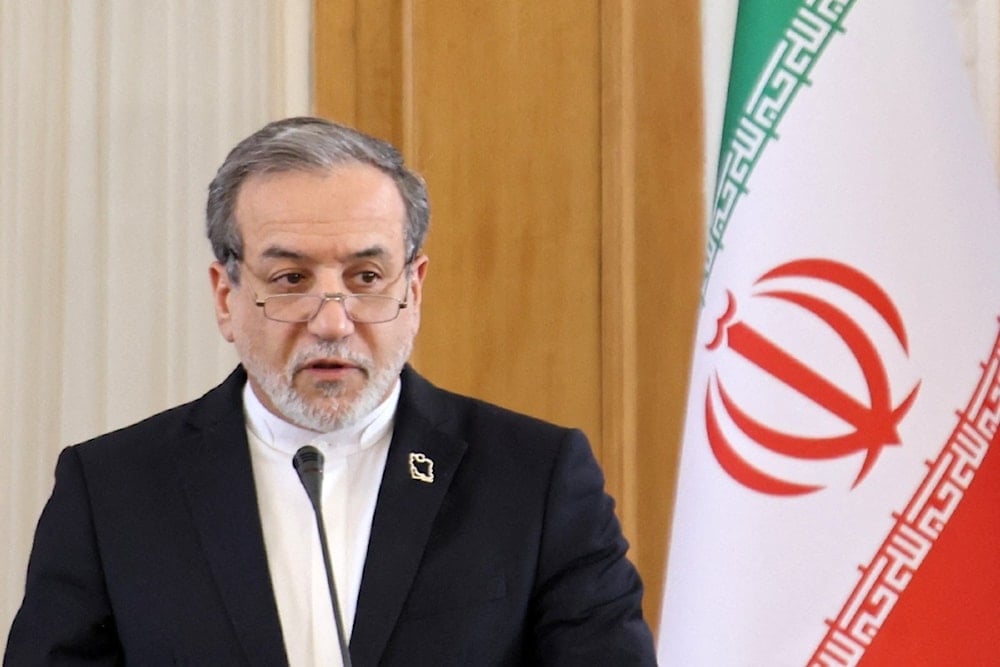Araghchi blasts E3 for enabling US aggression: The Guardian
Iran’s Foreign Minister Abbas Araghchi criticizes Britain, France, and Germany for enabling US policies, warning that Europe’s push to reinstate UN sanctions undermines diplomacy and risks further instability.
-

Iran's Foreign Minister Seyed Abbas Araghchi gives a joint press conference with the Omani Foreign Minister in Tehran on Dec 30, 2024 (PHOTO / AFP)
Iran’s Foreign Minister Abbas Araghchi has accused the European signatories of the 2015 nuclear agreement of abdicating their independent diplomatic roles and instead enabling Washington’s increasingly aggressive policies toward Tehran.
In a strongly worded commentary originally published in The Guardian, Araghchi criticized Britain, France, and Germany, collectively known as the E3, for their decision to activate the snapback mechanism of UN sanctions on Iran.
He said the move lacks legal standing and disregards the context and chronology of events that led Iran to take what he described as lawful remedial measures under the nuclear accord.
“Europe is today enabling the excesses of Washington,” Araghchi wrote, contrasting what he described as the E3’s previous role as a moderating force with its current submission to US demands.
The Joint Comprehensive Plan of Action (JCPOA), signed in 2015 by Iran, the E3, the US, China, and Russia, placed strict limits on Iran’s nuclear program in exchange for sanctions relief. However, Araghchi reiterated that it was Washington, not Tehran, that unilaterally withdrew from the agreement in 2018 under President Donald Trump, reimposing all sanctions and launching what Iran has termed a campaign of “maximum pressure.”
Despite the US withdrawal, the E3 failed to uphold their commitments to sustain trade and financial ties with Iran, Araghchi said. While initially expressing outrage and pledging to protect their economic relations with Tehran, the European powers ultimately fell in line with US policy, even welcoming military strikes on Iranian infrastructure.
He also accused European leaders of seeking relevance by aligning themselves with Washington’s maximalist posture, stating that “President Trump has made clear that he views the E3 as tangential actors,” citing Europe’s sidelining in major geopolitical crises like the Russia-Ukraine war as evidence of its declining strategic autonomy.
From negotiation to escalation
Recounting the early history of nuclear negotiations, Araghchi recalled that Iran welcomed the formation of the E3 in 2003, when it aimed to constrain the George W. Bush administration’s aggressive posturing in the region. Talks eventually collapsed, he said, due to Europe’s inability to stand up to Washington or offer meaningful guarantees.
By 2015, after nearly a decade of escalating sanctions and nuclear development, both Iran and the West reached a compromise: Iran would allow extensive oversight of its nuclear program in exchange for the lifting of sanctions. That formula, Araghchi said, worked until Trump dismantled it.
Europe’s inaction and Iran’s response
After the US exit from the JCPOA, European leaders publicly reaffirmed the agreement’s value. French Finance Minister Bruno Le Maire famously declared that Europe would not be treated as a “vassal”, while other officials stressed the importance of maintaining trade and financial channels with Tehran.
However, Araghchi noted that these promises went unfulfilled. Iran was left under sanctions while the E3 made no tangible efforts to deliver the economic benefits promised under the deal, such as the sale of oil and access to international banking.
He condemned the E3’s demand that Iran return to full compliance while they themselves remained in breach of the accord. This double standard, he argued, undermines the credibility of the European parties and disqualifies them from any meaningful diplomatic role.
Warning of consequences
Araghchi warned that Europe’s recent push to reinstate sanctions will likely backfire. Rather than gaining a seat at the table, the E3 risk being excluded from any future diplomatic framework, to the detriment of European global standing and credibility.
Despite these grievances, the foreign minister insisted that Iran remains committed to diplomacy. He reiterated that Tehran is prepared to negotiate a “realistic and lasting bargain,” one that includes strict oversight and limits on enrichment in exchange for the complete termination of sanctions.
“It does not make any sense for the E3 to claim participation in a deal built around enrichment in Iran while simultaneously demanding Iran abandon those very capabilities,” Araghchi noted.
He also criticized European leaders, particularly Germany’s chancellor, for endorsing illegal military strikes on Iranian nuclear sites protected under international law. Such actions, he warned, only fuel instability and undermine efforts toward a peaceful resolution.
A regional warning
Turning to regional dynamics, Araghchi took aim at "Israel", which he said was attempting to provoke broader conflict and drag the West into its confrontations with Iran. He claimed that Tehran’s armed forces were ready to respond forcefully to any aggression, as seen in the summer’s escalation, which he said inflicted significant material and strategic costs on both "Israel" and the US.
“The failed Israeli gambit this summer cost American taxpayers billions of dollars… and projected Washington as a reckless actor dragged into a rogue regime’s wars of choice,” he asserted.
Araghchi concluded by urging European states to return to an independent diplomatic posture and give meaningful diplomacy the space and time it needs to succeed.
“If Europe truly wants a diplomatic solution… it must abandon its subservience to Tel Aviv’s manufactured crises,” he said, warning that failure to do so would result in far more damaging consequences for the region and beyond.
Read more: Snapback mechanism risks EU's global diplomatic credibility: Analysis

 5 Min Read
5 Min Read









